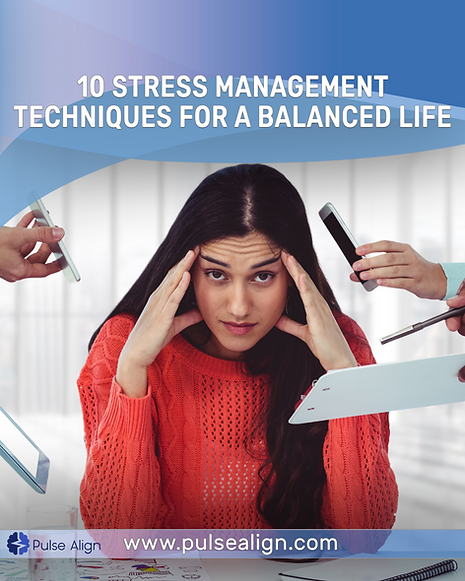In today’s fast-paced world, stress has become an inevitable part of our lives. Whether it’s due to work pressures, personal challenges, or the demands of everyday life, stress can take a toll on our mental and physical well-being. Stress management techniques can help us to cope with the challenge of stress management in daily life.
However, mastering stress is not about eliminating it, but rather managing it effectively to lead a more balanced and fulfilling life.
In the previous year, an overwhelming 74% of individuals experienced stress to the extent that they felt overwhelmed or incapable of coping. Hence, it is necessary to explore effective stress management techniques for a healthy lifestyle.
In this comprehensive guide, we will explore the top 10 stress management techniques that can help you navigate through life’s challenges with ease.
Understanding Stress Management Techniques
Stress management techniques encompass a range of strategies aimed at reducing the negative effects of stress on the mind and body. These techniques empower individuals to cope with stressors more effectively, thereby improving overall well-being. From mindfulness practices to lifestyle changes, there are various approaches to managing stress.
Top Stress Management Techniques
Mindfulness Meditation
Mindfulness meditation involves focusing your attention on the present moment without judgment. By practicing mindfulness, you can cultivate awareness of your thoughts, emotions, and bodily sensations. Research suggests that regular meditation can reduce stress, anxiety, and depression, promoting a sense of calm and inner peace.
Deep Breathing Exercises
Deep breathing exercises are simple yet powerful tools for stress management. By taking slow, deep breaths, you can activate the body’s relaxation response, lowering blood pressure and reducing muscle tension. Incorporating deep breathing into your daily routine can help alleviate stress and promote relaxation.
Exercise Regularly
Physical activity is not only beneficial for your physical health but also your mental well-being. Engaging in regular exercise releases endorphins, neurotransmitters that boost mood and reduce stress. Whether it’s going for a brisk walk, practicing yoga, or hitting the gym, find an activity that you enjoy and make it a regular part of your routine.
Maintain a Healthy Lifestyle
Eating a balanced diet, getting adequate sleep, and avoiding excessive alcohol and caffeine consumption are essential aspects of stress management. A nourished body is better equipped to handle stress, while poor lifestyle choices can exacerbate its effects.
Time Management Techniques
Effective time management can help reduce feelings of overwhelm and stress. Prioritize tasks, set realistic goals, and break larger projects into smaller, manageable steps. By managing your time efficiently, you can increase productivity and reduce stress levels.
Seek Social Support
Connecting with friends, family, and support networks can provide valuable emotional support during times of stress. Sharing your feelings and experiences with others can offer perspective and validation, helping you feel less alone in your struggles.
Practice Gratitude
Cultivating an attitude of gratitude can shift your focus from what’s causing stress to what you’re thankful for in your life. Keep a gratitude journal, take time to appreciate the little things, and express gratitude to those around you. Gratitude has been linked to improved mood and resilience in the face of adversity.
Set Boundaries
Learning to say no and set boundaries is essential for maintaining your mental and emotional well-being. Identify your limits and communicate them assertively with others. By respecting your own boundaries, you can prevent burnout and preserve your energy for what truly matters.
Engage in Relaxation Techniques
Incorporate relaxation techniques such as progressive muscle relaxation, guided imagery, or aromatherapy into your daily routine. These practices can help calm the mind and body, promoting a sense of relaxation and inner peace.
Practice Self-Care
Self-care involves prioritizing your physical, emotional, and mental needs. Make time for activities that bring you joy and relaxation, whether it’s reading a book, taking a bath, or spending time in nature. Taking care of yourself is not selfish but essential for overall well-being.
The Role of Pulse Align in Stress Management
Pulse Align offers a holistic approach to stress management by addressing the root causes rather than just treating the symptoms. By identifying imbalances in the body’s energy systems, Pulse Align aims to restore harmony and promote optimal health. While complete healing cannot be guaranteed, many individuals have reported significant improvements in their well-being after undergoing Pulse Align treatments.
Research studies have shown promising results regarding the effectiveness of Pulse Align in reducing stress and promoting relaxation. According to a study published in the Journal of Alternative and Complementary Medicine, participants who received Pulse Align treatments experienced a significant reduction in stress levels compared to the control group.
Conclusion: Embrace a Balanced Lifestyle with Pulse Align
In conclusion, mastering stress requires a multifaceted approach that addresses the mind, body, and spirit. By incorporating the top 10 stress management techniques into your daily life, you can cultivate resilience and lead a more fulfilling existence. Additionally, exploring holistic modalities such as Pulse Align can offer valuable insights into achieving optimal well-being.
While Pulse Align is not a magic cure-all, it can complement your existing stress management practices and support your journey toward greater balance and vitality. By addressing the root causes of stress and promoting holistic healing, Pulse Align empowers you to reclaim control of your health and vitality. Consider embracing lifestyle changes and exploring Pulse Align for improved well-being through a natural return to normal function.
Remember, managing stress is not about eliminating it entirely but rather developing the resilience and tools to navigate life’s challenges with grace and ease. With dedication, self-awareness, and support, you can cultivate a life filled with peace, purpose, and vitality.
Reference
Mental Health Foundation (n.d). Evidence & Research. Available at http://bemindful.co.uk/evidence-research/ [Accessed August 2015].
As the visionary CEO of Pulse Align, François is dedicated to transforming the landscape of pain management and posture health. With a deep-rooted passion for innovation and a commitment to excellence, François leads the team in developing cutting-edge solutions that empower individuals to live healthier, pain-free lives. Under his leadership, Pulse Align has become a beacon of hope and support for those navigating postural-related issues and chronic pain. François brings a wealth of experience in neuromodulation and patient management technologies, combining strategic insight with a compassionate approach to address the unique challenges faced by each individual.



